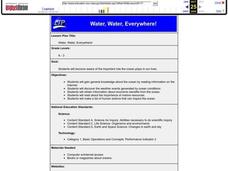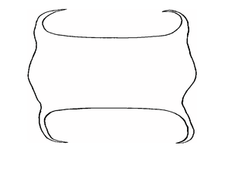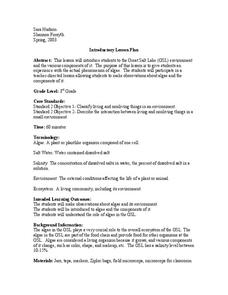California Academy of Science
Sustainable Fishing in the Philippines
Understanding the importance of sustainable fishing practices is fostered through a classroom game. In small groups, the class plays a fishing game where they can see first-hand, the effects of thoughtless fishing practices. After the...
Clean Up Australia
Why are Batteries Harmful to the Environment?
Open this lesson by reading together about primary and secondary batteries (such as nickel-cadmium cells), problems they can cause in the environment, and how humans can minimize the damage. Afterward, little ones examine a collection of...
Curated OER
Alphabet Vocabulary
Third graders explore the biodiversity that exist on the prairie. Through reading or listening to books, they keep track of vocabulary words associated with the prairie on an 'Alphabet Poster'.
Curated OER
The Alphabet Garden
Third graders transplant, tend and observe a plant for each letter of the alphabet in a school garden. They work individually to research and select a plant that will grow in their local climate. Students then care for and observe the...
Curated OER
Fossil Fuels: Facing the Issues
Students explore energy by researching fuel usage on Earth. In this fossil fuel lesson, students define fossil fuels, the energy created by burning them, and the impact on the environment when using them. Students conduct pollution...
Mary Pope Osborne, Classroom Adventures Program
Mummies in the Morning Egyptian pyramids, hieroglyphics
Visit the Magic Treehouse and take your class on a trip through time with a reading of the children's book Mummies in the Morning. Using the story to spark an investigation into Egyptian culture, this literature unit engages...
Curated OER
Ecological Citizen
Students examine the interconnectedness of living and non-living things that constitute an ecosystem. They examine fallen trees,insects, living trees, leaves, food webs, and forests. They conduct various activities and write poems about...
Curated OER
Ecosystem Organization - Lesson Plan
Student explore ecosystems. In this ecosystem organization lesson, students consider how scientists study living organisms. Students participate in a teacher guided activity that requires them to visualize an organism and imagine its...
Curated OER
Water, Water, Everywhere!
Students become aware of the important role the ocean plays in our lives. Students will gain general knowledge about the ocean by reading information on the Internet. They discover the weather events generated by ocean conditions.
Curated OER
Homer T. Cat, Poem
Students read a poem about a cat. Students discuss how cats behave and examine Homer's life in his environment.
Curated OER
This Is Tree-rific!
Third graders view a clip of the video Backyard Safari, "Trees," and portray the life cycle of a tree. They also view a clip on structures of a tree and draw a diagram of a tree in their science journals.
Curated OER
Skates
Students gain understanding of structure, characteristics, and basic needs of living things and their role in world, identify parts of skate, observe details of skate's body and skate egg case, and identify unique characteristics of skates.
Curated OER
Ladybugs
Students read The Grouchy Ladybug by Eric Carle, and explore the life cycle of ladybugs and how they interact with our environment.
Curated OER
Great North
Students view a video about the Arctic Circle, North Pole and Northern Europe. They locate areas using a map. They create a drawing of the countries where the Inuit live.
Curated OER
Invertebrates
Students identify insect body parts and look for local insect life. They create an insect using recycled material and design a classroom mural with bug facts. They study Monarch butterflies and dragonflies.
Curated OER
Spy on a Spider
Learners view slides or live specimens to name and describe the distinguishing features of groups of arthropods, especially spiders and insects. They complete worksheets, observe webs and then search for and record where spiders can be...
Curated OER
Cicada Invasion
Students consider how some animals, periodical cicadas, survive well in a particular environment due to the species' life cycle.
Curated OER
Make an Edible Coral Reef
Young scholars create an edible coral reef out of food and candy. In this Science lesson, students explore what a coral reef is and the coral reef's importance to the ecosystem. Additionally, young scholars discover the different...
Curated OER
Rainforest Deforestation and the Water Cycle
Students create terrariums (mini rainforests). They observe and discuss the life processes that occur in their terrariums and how changes in these processes affect the plants and organisms inside. They collect and graph data and present...
Curated OER
Egg Carton Coral
Students use egg cartons to construct models of coral colonies showing
many aspects of the coral's natural history - including the structure of
coral polyps and the coral colony's colonial life style.
Curated OER
Lights Out!
Students examine static and current electricity, and discuss what their lives would be like without electricity. They listen to a teacher-led lecture about electrons and atoms, and explore static electricity using a comb or a balloon...
Curated OER
Great Salt Lake
Third graders are introduced to the Great Salt Lake (GSL) environment and the various components of it. They make observations about algae and its environment and discuss why it is considered a living organism and various components of...
Curated OER
Ladybugs
Students listen to the book, The Grouchy Ladybug, and discuss what they know about ladybugs. They observe live ladybugs, write down what they see, and write a short story about ladybugs.
Curated OER
Bats Migrate South
Students examine the life of bats in Illinois. Using the internet, they research the history of the bat in Illinois and describe the way they find prey by using echolocation. They report their findings to the class and answer any...























